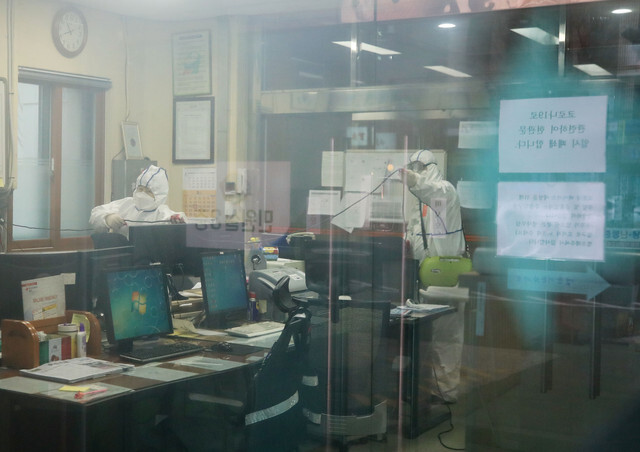hankyoreh
Links to other country sites 다른 나라 사이트 링크
Gyeonggi Province to restrict services at 137 churches for violating disease prevention regulations

Amid an increase in novel coronavirus transmission clusters chiefly involving churches in the Greater Seoul area, Gyeonggi Province announced intensive countermeasures on Mar. 17 that include restrictions on “densely attended” services at 137 churches that failed to observe disease prevention and control guidelines. The decision was influenced by mass infections at River of Grace Community Church in Seongnam, where over 50 people have tested positive, as well as Saengmeyoung-soo Church in Bucheon and Saengmyeong-saem Presbyterian Church in Suwon.
According to announcements by the Korea Centers for Disease Control and Prevention (KCDC), 93 additional coronavirus cases had been diagnosed as of Mar. 18, 12:00 am, bringing the total number of confirmed cases to date to 8,413. The 31 new infections recorded in Gyeonggi Province on Mar. 17 represented the province’s largest increase in cases since its first diagnosis on Jan. 26. KCDC Vice Chairman Kwon Jun-wook said that Gyeonggi Province was “one of the areas we will need to observe closely among today’s figures.”
“When you have over 30 cases occurring under a single local government within one day, that is definitely not a situation you can afford to take lightly,” he stressed.
The same day, Gyeonggi Province issued an administrative order restricting large gatherings at religious facilities through Mar. 29 for 137 churches that have violated disease control and prevention guidelines among the province’s 2,635 total churches. The current Infectious Disease Control and Prevention Act states that the Minister of Health and Welfare and/or metropolitan city mayor or provincial governor may restrict or prohibit assemblies and ceremonies for the purposes of infection disease prevention.
The 137 churches will only be able to hold services if they observe seven disease control and prevention guidelines: temperature checks for congregation members, usage of face masks, keeping distance of two or more meters during gathering, sanitizing of facilities before and after use in gatherings, prohibitions on food being provided during services, and the compilation of a list of service attendees with contact information. Those found to be carrying out services in violation of these guidelines may be penalized with a fine up of to 3 million won (US$2,419).
Amid an emerging crisis of cluster infections centering on church services, the KCDC has been focusing on persuading churches to cooperate voluntarily.
“The consultative group is currently discussing measures such as ways of providing technical support and guidelines for the holding of online services, concrete guidance on what preventive measures are needed for religious events, and prior announcement of the potential problems that can arise in cases of violations,” explained Kim Kang-lip, the KCDC’s first general coordinator.
But in an apparent acknowledgement of the potential controversy over infringements of religious freedom, Kim stressed that the restrictions on services are “a very sensitive issue, adding that “violations of the public’s rights must be predicated on the need for a balanced judgment relative to the benefits to be obtained through those violations.” The city of Seoul has also expressed plans to continue providing support for disease prevention costs to small-scale churches while working to persuade them to suspend services. Yu Yeon-sik, director of the city’s culture headquarters, said Seoul had “no plans at present” to issue an administrative order restricting religious gatherings.
Meanwhile, with 55 diagnoses (47 South Koreans and eight foreign nationals) confirmed recently during arrival quarantine procedures, the KCDC plans to expand special entry procedures to all South Korean and foreign nationals arriving from overseas as of Mar. 19. Among the 55 confirmed cases, the largest number were arrivals from Europe at 27, followed by China at 16 and other Asian countries besides China at 12.
By Noh Ji-won, Park Da-hae, and Seo Hye-mi, staff reporters, and Hong Yong-duk, South Gyeonggi correspondent
Please direct comments to [english@hani.co.kr]

Editorial・opinion
![[Column] Has Korea, too, crossed the Rubicon on China? [Column] Has Korea, too, crossed the Rubicon on China?](https://flexible.img.hani.co.kr/flexible/normal/500/300/imgdb/original/2024/0419/9317135153409185.jpg) [Column] Has Korea, too, crossed the Rubicon on China?
[Column] Has Korea, too, crossed the Rubicon on China?![[Correspondent’s column] In Japan’s alliance with US, echoes of its past alliances with UK [Correspondent’s column] In Japan’s alliance with US, echoes of its past alliances with UK](https://flexible.img.hani.co.kr/flexible/normal/500/300/imgdb/original/2024/0419/2317135166563519.jpg) [Correspondent’s column] In Japan’s alliance with US, echoes of its past alliances with UK
[Correspondent’s column] In Japan’s alliance with US, echoes of its past alliances with UK- [Editorial] Does Yoon think the Korean public is wrong?
- [Editorial] As it bolsters its alliance with US, Japan must be accountable for past
- [Guest essay] Amending the Constitution is Yoon’s key to leaving office in public’s good graces
- [Editorial] 10 years on, lessons of Sewol tragedy must never be forgotten
- [Column] A death blow to Korea’s prosecutor politics
- [Correspondent’s column] The US and the end of Japanese pacifism
- [Guest essay] How Korea turned its trainee doctors into monsters
- [Guest essay] As someone who helped forge Seoul-Moscow ties, their status today troubles me
Most viewed articles
- 1[Column] The clock is ticking for Korea’s first lady
- 2After 2 months of delayed, denied medical care, Koreans worry worst may be yet to come
- 3[Column] Has Korea, too, crossed the Rubicon on China?
- 4US overtakes China as Korea’s top export market, prompting trade sanction jitters
- 5[Correspondent’s column] In Japan’s alliance with US, echoes of its past alliances with UK
- 6Hong Se-hwa, voice for tolerance whose memoir of exile touched a chord, dies at 76
- 7All eyes on Xiaomi after it pulls off EV that Apple couldn’t
- 8[News analysis] After elections, prosecutorial reform will likely make legislative agenda
- 9More South Koreans, particularly the young, are leaving their religions
- 10John Linton, descendant of US missionaries and naturalized Korean citizen, to lead PPP’s reform effo